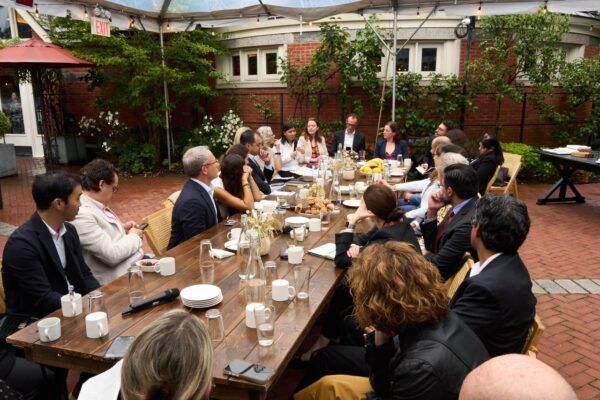A major new wave of private sector action is underway in the fight against climate change and air pollution. Leading global companies Inter IKEA Group, logistics company Maersk, and consumer healthcare company Haleon have implemented reporting measures to help combat the super pollutant, tropospheric ozone. Using a guide launched at COP27 that focuses on bottom-up activity-based calculations, these businesses are, for the first time, publicly disclosing their non-methane volatile organic compounds (VOCs) emissions using activity-based calculations.
Announced at the US-China Summit on Methane and Non-CO2 Greenhouse Gases at COP29, the initiatives include measuring and reporting key precursors to tropospheric ozone within their value chain, particularly non-methane VOCs.
Tropospheric ozone is one of the super pollutants, including methane and nitrous oxide, that are driving 45% of global warming. Tropospheric ozone is also responsible for nearly 500,000 people dying from air pollution every year. Tropospheric ozone has caused approximately 0.23°C of present-day warming. The damage it causes goes beyond climate change – it also contributes massively to air pollution, damages crops and seriously affects people’s health. It’s formed when sunlight interacts with nitrogen oxides and volatile organic compounds (VOCs), which include methane. These are largely emitted from transport, industry, livestock and generating energy.
Private sector leadership is essential in addressing the climate crisis and improving air quality globally. Tropospheric ozone, and the volatile organic compounds that help create it, is a significant but often overlooked part of the climate problem. Understanding where volatile organic compounds are coming from is key to reducing these emissions, and the measurement and reporting commitments made by Inter IKEA Group, Maersk, and Haleon, are a critical step forward. We encourage more companies to follow their lead.
Rick Duke, United States Deputy Special Envoy for Climate
Inter IKEA Group, Maersk, and Haleon are part of the Clean Air Fund’s Alliance for Clean Air, a pioneering collaboration hosted by the World Economic Forum. As members of this alliance, the participating businesses are committed to measuring and reducing their emissions of air pollutants, including those that contribute to the formation of tropospheric ozone, such as non-methane VOCs. They do this using a guide developed by the Stockholm Environment Institute, Climate and Clean Air Coalition and the Inter IKEA Group to measure their air pollutant emissions.
Businesses have a critical role in tackling the climate and global air pollution crisis, and the leadership demonstrated by companies like Inter IKEA Group, Maersk, and Haleon serves as an example for others to follow. Unfortunately, pollutants like tropospheric ozone remain underrepresented in current climate and air quality strategies at a global, national, and local level. To create effective, region-specific solutions, we need more localised research into the pollutants. The research conducted by these businesses is crucial in driving these efforts forward and are not only contributing to a deeper understanding of air quality challenges, but also taking concrete steps to safeguard both human health and the environment.
Jane Burston, CEO of Clean Air Fund
At COP29, the Clean Air Fund will launch the first comprehensive policy report into tropospheric ozone. The report will share recommendations for how policymakers around the world can help combat the dangerous super pollutant and reduce the harmful effects on both health and the environment. Subscribe here to get the report straight to your inbox.


